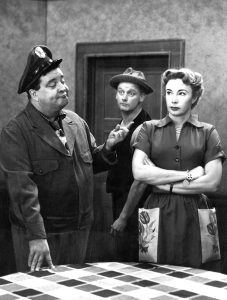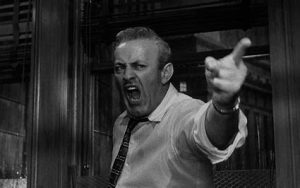
“Dying is easy; comedy is hard.” You’ve probably heard this adage, but like most clichés and adages, they present a truth, and their truth justifies their frequency.
...never, never, never step on laughter.
 Comedy has been around as long as humanity, and possibly before. Shamen and shawomen, often the disabled, the chronically ill, or the insane, made themselves useful to a community by making people laugh. Shakespeare’s fools, for example, are commonly flawed beings who “sing for their supper” by playing the fool in order to survive.
Comedy has been around as long as humanity, and possibly before. Shamen and shawomen, often the disabled, the chronically ill, or the insane, made themselves useful to a community by making people laugh. Shakespeare’s fools, for example, are commonly flawed beings who “sing for their supper” by playing the fool in order to survive.
Fools, as comedians, still fall into two ancient categories: those who make fun of others and those who make fun of themselves. Comedy began as a dangerous game: evoke laughter or be thrown to the dogs if the monarch doesn’t like the punchline. Standup comedians still usually fall into one category or another, from the self-effacing Minnie Pearl or Rodney Dangerfield to the insults and aggressions of Lenny Bruce. The bomb of a joke gone bad always lurks in the next line or slight-of-hand.
Comedy is impossible to write. I took a comedy writing course with Danny Simon, who, among the jewels of wisdom he bestowed, couldn’t stop repeating the fact that he, Danny, not brother Neil, had come up with the idea for The Odd Couple.
 Beyond the dubious veracity of Danny Simon’s claim to fame, his cardinal advice remains — don’t try to be funny; no one will laugh and you’ll die trying. Comedy has to emerge organically from character and situation. Hence the term “situation comedy.”
Beyond the dubious veracity of Danny Simon’s claim to fame, his cardinal advice remains — don’t try to be funny; no one will laugh and you’ll die trying. Comedy has to emerge organically from character and situation. Hence the term “situation comedy.”
Lines that don’t emerge from those two sources are called “joke jokes,” meaning they’re slapped into the script to evoke a laugh. They generally bomb unless they are about sex or drugs, like cocaine. Scatological references are hit and miss; references to a local person, place, or event can evoke a joke-joke laugh, but it’s not ironclad. Real comedy builds organically, line by line, from character and scene.
Satire offers another razor’s edge for writers and performers. Advocates for social justice, political issues, or humanitarian crises enlist satirical humor — ironic exaggeration or absurdity to expose and humiliate stupidity, greed, and hubris in a culture.
But satire can backfire. It’s power to humiliate may strike at too many sensibilities, resulting in off-putting insult. Assaulting an audience only works for a few comedians and in rare situations. Satire is best used to cheer lead already unified factions.
 Satirist Jonathan Swift, in A Modest Proposal, uses self-derogatory comedy to avoid insulting his audience. His earnest, exaggerated, brainless, faux-serious pomposity suggests that cooking and eating the infants of the poor might solve poverty, but never attacks his audience. Instead, Swift takes the blows for this ridiculous suggestion, but the discerning audience can see through the satire to contemplate the cold truths of overpopulation and the lack of social service.
Satirist Jonathan Swift, in A Modest Proposal, uses self-derogatory comedy to avoid insulting his audience. His earnest, exaggerated, brainless, faux-serious pomposity suggests that cooking and eating the infants of the poor might solve poverty, but never attacks his audience. Instead, Swift takes the blows for this ridiculous suggestion, but the discerning audience can see through the satire to contemplate the cold truths of overpopulation and the lack of social service.
*
Okay, we’ve tripped lightly over the ups and downs of writing comedy. How about performing comedy? I love to act in comedy. There is nothing so satisfying as delivering a punch line or executing a double take that triggers an audience to explode into laughter as one, united organism. Well-delivered laughter can hit the performer like a wave, affirming the performer’s fragile spirit and unifying an audience.
How does comedy unify an audience? When you make people laugh, they begin to trust you. When they begin to trust you, they open their eyes, ears, and minds to what you are doing and saying. Comedy often carries with it the pen’s most powerful ammunition.
But performing comedy is like riding a bull. You can be thrown at any moment. To survive as a comic actor, I’ve come up with a few rudiments:
- Know your lines! Comedy depends on timing and timing depends on the actor’s flawless knowledge of what comes before and after any comic line, be it developmental or a punch line.
- Never step on another actor’s line.
 Comedy often depends on well-timed dialog where each actor’s line builds to a punch line. Vaudeville and situation comedy depend on perfect sequence and delivery.
Comedy often depends on well-timed dialog where each actor’s line builds to a punch line. Vaudeville and situation comedy depend on perfect sequence and delivery. - The same rule applies to physical comedy. Unless you are a lonesome clown or silent mime (ugh), physical comedy often involves a dialog of bodies. Commedia dell’arte and vaudeville are both rife with lazzi, gags that can be inserted to further the action and tell the story. In a physical comedy or lazzi, acrobatic timing is essential with each character knowing which move comes next. For example, one character serves wine at a dinner, but keeps drinking it all before filling the cups of the guests. He feigns shock at the empty bottle, apologizes and runs off to get more wine; and the lazzo repeats.
- Regardless of the nature of the comedy, a lazzi, a scripted dialog, or improvised scene, never, never, never step on laughter. Let them laugh. The dramatic timing can resume after you feel the laughter subside.
- The same applies to tragedy or the portrayal of sadness. Generating tears is a good acting exercise. But on stage, the audience doesn’t want to see you cry; they’re not there to comfort you; they want to cry in empathy with your character’s sadness.
- Be ready for unexpected laughter. Audiences are fickle and often act as a single organism. Thursday’s audience my remain silent through a punchline or pratfall; Friday’s audience may roar.
- Finally, never step on laughter evoked by another actor’s punch line. They will come after you onstage or off. Your only defense is to run, run, run!
Now that’s comedy!
# # #
Writer, editor, and educator based in Los Angeles. He's also played a lot of music. Degelman teaches writing at California State University, Los Angeles.
Degelman lives in the hills of Hollywood with his companion on the road of life, four cats, assorted dogs, and a coterie of communard brothers and sisters.



Thank you, sage teacher, for this excellent lesson in comedy in all its forms. As you so deftly point out, it is not easy to pull off, but so satisfying for all involved when done well. And please, don’t step on my laugh lines!
Dearest Betsy… I wouldn’t DARE step on your laugh lines! Talk about rage and retribution!
Thanx Chas for this wonderful treatise on comedy, and why it’s so hard to write and to perform well.
There’s a revival on Bway at the moment I found very funny, wonder if it was ever mounted in CA and if you saw if and liked it – The Play that Goes Wrong.
Thanks, Dana. I don’t know the play. If it’s a revival, when did it first open?
Charlie, thanks for putting this microscope on the nature, challenge, and effects of comedy and comedians. I also like the Lee J. Cobb image from 12 Angry Men that depicts the comedian’s audience as a tough jury. And when you mention that doing comedy is like riding a bull that can toss you at any moment, I remember being thrown myself while in the middle of a guitar performance!
Having been under the spotlight too much, I figured it would be worth a try to look at what this ancient, no, timeless, foolishness looked at from my POV…for what it’s worth.